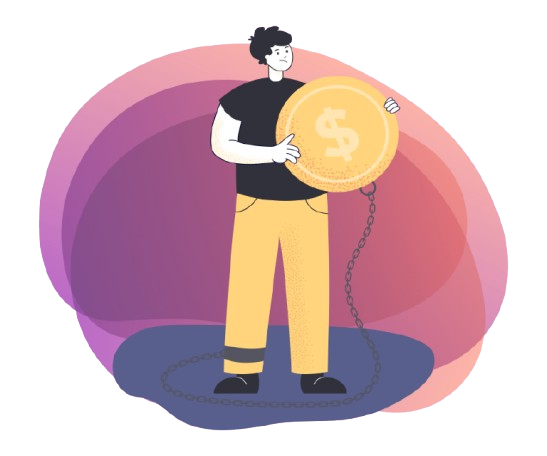When dealing with a mountain of debt, the term ‘debt consolidation’ can seem like a lifeline. But what exactly does it mean? Simply put, debt consolidation involves taking multiple debts and combining them into a single payment. Think of it like reorganizing your life to make things simpler and more manageable.
One of the big benefits of consolidating debt is a potential boost to your credit score. I know, it sounds almost too good to be true. But when you consolidate your debt, you can reduce your credit utilization ratio—the amount of debt you’re using compared to your available credit—which is a key factor in determining your credit score.
Now, imagine the flip side. If not handled carefully, consolidating your debt might hurt your credit score. Opening new credit lines or loans can temporarily ding your score, and closing old accounts can shorten your credit history, which isn’t ideal. Being aware of these potential pitfalls lets you step into the consolidation process with eyes wide open.
Before taking the consolidation plunge, it’s crucial to know the lay of the land regarding the methods available. From personal loans and balance transfer credit cards to home equity loans and debt management plans, each offers a different path forward with its own pros and cons. Picking the right option for you can make all the difference in protecting your credit score.
“Disclosure: Some of the links in this post are affiliate links. This means if you click on the link and purchase the item, I may receive an affiliate commission at no extra cost to you. I only recommend products and services I personally use and believe will add value to my readers.”
Contents
Exploring Different Debt Consolidation Options

Navigating the world of debt consolidation options can feel like walking through a department store with endless choices. Each option comes with its perks and quirks, which is why understanding them is crucial before making a move.
- Personal loans can be a straightforward way to consolidate debt. They’re like a one-size-fits-all sweater—simple and effective. What makes them appealing is that they often come with fixed interest rates and set repayment terms, giving you a clear picture of what you owe and when it’ll be paid off. However, it’s essential to compare rates and fees because these can vary wildly between lenders.
- Balance transfer credit cards are another handy tool, especially if you’re looking to tackle high-interest credit card debt. With offers like 0% interest for a certain period, they lure you in with promises of lower payments. But remember, these usually come with balance transfer fees and can skyrocket in interest if not paid off during the promo period.
- Home equity loans and lines of credit bring real estate into the financial mix. They leverage your home’s value, potentially offering lower interest rates than unsecured options. While this sounds tempting, there’s a big caution flag: your home becomes collateral. Missing payments could risk your roof, literally.
- Debt management plans, usually facilitated by credit counseling agencies, offer structured repayment plans. These aren’t loans themselves but instead help you renegotiate terms with creditors. They can be valuable for those who need help staying disciplined with payments but always check that you’re working with a reputable agency.
Whether you’re opting for a loan, a balance transfer, or another path, knowing is half the battle. Each option impacts your credit score differently, so weigh these against your personal situation. The right choice should support your financial goals without compromising your credit score’s health.
Criteria to Maintain and Improve Credit Scores During Consolidation

Keeping your credit score intact while managing debt might seem like juggling plates, but it’s doable with the right steps. Consistent payments on your loan or credit card are crucial. Each on-time payment builds a solid foundation for your credit score, leading those FICO numbers to sing happily in your favor.
Another piece of the puzzle is your credit utilization ratio. Think of it like the gas gauge in your car—the lower the better. Ideally, you want to keep it below 30%. Paying down your balances can help here. Once your debts are consolidated, continue managing this ratio wisely to see favorable results on your score.
Old credit accounts might seem like clutter once you’ve consolidated, but don’t be too hasty in closing them. Keeping these accounts open can positively impact your credit length history, which is particularly influential in your overall credit health.
Staying on top of your credit reports is also a smart move. Regularly checking your credit report helps spot errors that could unfairly harm your score. You’re entitled to free reports from major credit bureaus annually, so take advantage of this feature to ensure everything is accounted for and accurate.
At this point, it’s about a continuous effort to maintain your credit health. A mixture of discipline, savvy financial habits, and proactive monitoring can make a significant difference in how your credit score responds post-consolidation.
Real-Life Case Studies: Debt Consolidation Success Stories
Seeing theory turn into practice is always enlightening, especially when it comes to debt consolidation. Real-life scenarios paint a clearer picture of potential outcomes and spark inspiration.
- Take John, for instance. John was staring down a $20,000 credit card debt mountain. He opted for a personal loan to consolidate it. At first, his credit score took a slight hit due to the new account. But over time, as he made consistent monthly payments, his score improved significantly, from around 620 to 700. It’s an encouraging example of how patience and regular payments can yield long-term credit benefits.
- Then there’s Sarah, who had $15,000 to tackle. She went with a balance transfer credit card, seduced by a 0% interest offer for 18 months. This move required strategic budgeting to ensure she paid off the amount before the interest rate jumped. Sarah’s score also saw an upward trajectory, thanks to smart planning and careful spending post-transfer.
- Mark faced a daunting $50,000 in various debts. Leveraging his home’s equity seemed risky, but it proved fruitful. The key was Mark’s disciplined approach to repayment. His credit score, which was teetering around 680, rose to over 750 as he diligently paid more than the minimum monthly installment.
Each of these folks teaches us valuable lessons in fiscal management and the importance of tailoring debt consolidation methods to personal situations. Picking the right strategy, combined with commitment, can lead not just to financial relief but also credit score recovery.
Expert Tips for a Successful Debt Consolidation Strategy

A successful debt consolidation plan isn’t just about choosing the right method; it’s also about laying down a smart financial roadmap. One of the first steps is selecting an option that suits your financial behavior and obligations. Whether it’s a loan, a credit card, or a home equity strategy, make sure it aligns with your capacity to manage and repay comfortably without stress.
Engaging with professionals like credit counselors or financial advisors can also be a game-changer. They provide an objective perspective and help you avoid common pitfalls that might trip you up on your consolidation journey. Additionally, they can help tailor strategies to your unique financial landscape.
Budgeting tools and techniques are another essential weapon in your arsenal. Think of these as the GPS for your financial journey. Regularly track your income and expenses and ensure you’re not racking up new debt. It’s about creating a budget that you can stick to—one that still allows for some flexibility and fun, of course.
Long-term financial habits are like the vitamins for your credit score. Maintain consistent payments, monitor your credit usage, and keep an eye on your credit reports. This approach doesn’t just help you now; it sets you up for a healthy financial future.
Ultimately, approaching debt consolidation with a clear strategy and the right tools can maintain your credit score while easing debt anxiety. It’s about smart, informed moves that align with your individual finances.


The deeper you fall into debt, the harder it is to climb out, and you have given some wonderful ways to consolidate your debt without hurting your credit score more. I actually didn’t know that this could even be done.
I think that Sarah was really clever to take out that credit card offer at 0% interest, and if you are sure you can manage this, I think it is the way to go. Do you have any tips to be disciplined in your spending in the first place so you don’t end up in this predicament?
Great point, Michel! Staying disciplined starts with tracking expenses, setting a clear budget, and avoiding impulse buys. Automating payments also helps you stick to the plan.